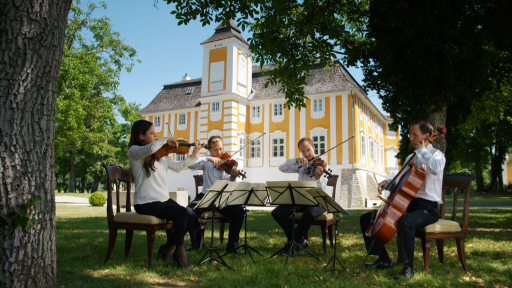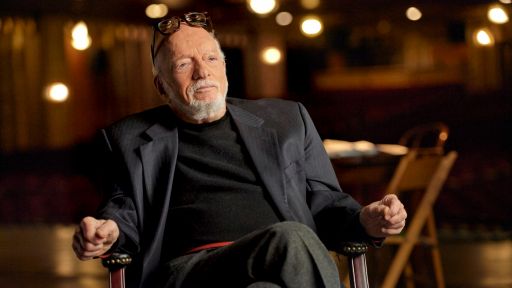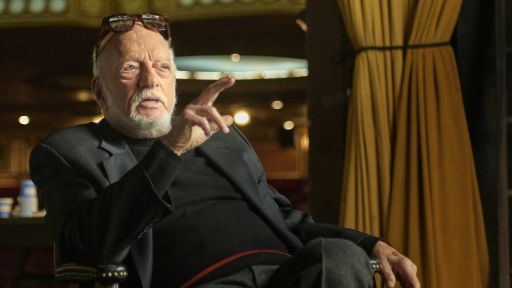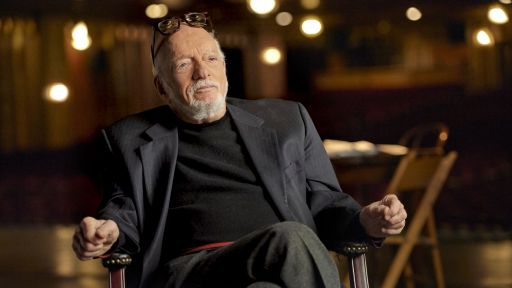Features




I already messed up jazz hands... jazz hands is like my my comfort zone default. I see... Hi Broadway Babies, I'm Elisa Lichtenbaum from Great Performances and we are here to get jazzed for Broadway's Best!
I am sitting here with my very special guest. Mr. Lonny Price who, hello, where we should say welcome... Bienvenue... welcome. Thank you very much.
Lonnie is the director of our next Broadway's Best episode, which is 'Harold Prince: The Director's Life' [HAROLD] People are open to [HAROLD] more than just happy-go-lucky [HAROLD] entertainment.
[HAROLD] Open to looking at themselves in a mirror So, Lonny, for those people out there who may not know who Harold Prince is or they know they've heard his name but don't know all that he's accomplished. Can you give us a little crash course in all things Hal Prince?
Yea... I hope it won't be too long an answer. Hal's been working in the theatre for seven decades.
He started as a producer and right off the bat. He had enormous success with 'The Pajama Game', 'Damn Yankees'... 'Fiorello!' which won a Pulitzer... 'West Side Story' 'Fiddler on the Roof' and around that time he started directing 'She Loves Me' the original production of 'She Loves Me' and then in the seventies He had an enormously successful decade with Stephen Sondheim directing and producing 'Company'...'Follies!'... 'A Little Night Music' 'Pacific Overtures' and of course the amazing 'Sweeney Todd' and then with Andrew Lloyd Webber he directed the longest-running musical in the history of our life and any other life 'Phantom of the Opera' I had a meeting with David Horne who this was a passion of his to do this which I'm very grateful to him for and David Thompson who wrote 'Prince of Broadway' and collaborated with Hal on that and um I guess they just sort of floated the idea of what do you think? And I said anything for Hal and Yeah, it was a way for me to to give back and to thank him for what he's done for me personally and also just For the theater in general which is an enormous amount David Horne is the executive producer of Great Performances. I know that he was he's been wanting to do a documentary [HAROLD] I certainly am in favor of more radical elements to a musical [HAROLD] something that surprises [HAROLD] Your audience likes to be entertained but it also is open to [HAROLD] controversy to politics [HAROLD] to change.
What's great about Hal is the show's always had something on their mind they weren't about sheer entertainment which I think is amazing sheer entertainment and I enjoy it but his kind of theater made you think He always said I want you to leave the theater but I don't want you to leave the show and If you see cabaret or you see a 'Evita' which is an extraordinary piece of work you think about the think about fascism and think about celebrity and you think about The rise of Nazism and you think about for instance you're talking about Joel Grey in 'Caberet' I mean who would think that I want a character to represent Germany [HAROLD] A director's responsibilities are many choosing the material [HAROLD] developing it... working with the writers... with the designers [HAROLD] casting rehearsals, but above all a director needs a guiding principle [HAROLD] for me it's the idea of theater as a black box I know you in the film on number of times the phrase the theater as a black box Yeah... came up that that was a very central metaphor moving him Do you think that that is something that carried over into all of the work that he did or it was just more of a process... creative process kind of idea?
I think he starts with with the black box I think the thing and I think the film explains it I think very cogently is the difference between a film and television and the theatre is that if you're watching a film the ashtrays are period and the carpet and the drapes and the bedspread and all of that and the theater if you give an audience a beautiful bed, they will fill in the paintings and all the rest of it that their engagement their magination is working while they're watching the show so that there is a real live give-and-take Because you're not giving them everything if you were to do that scene in a film it would all be provided for you, and it's a little more of a passive experience But Hal's whole ideology is to suggest something and let the audience fill in the rest of it and that makes their participation necessary and engaging The idea for 'Company' to be a musical is Hal's That alone would be enough to you know Canonize them if that's the right word but that's just one of so many things also that he just not only discovered but gave breaks to Bock and Harnick and Kander and Ebb and Steve and the nurturing Jason Robert Brown recently the nurturing of great writers and the other thing is just Hal's influence. I mean since the 50s, there's not been a significant musical that Hal hasn't either produced, produced and directed directed or influenced and that means Hamilton and that means every great or anything that has any musical of any importance at all has Hal's stamp on it and I'm not sure that everybody knows that we see a lot of revivals of shows of his and oftentimes he's not mentioned which wounds me a little bit because they wouldn't exist without him and I think this shows that he is very much was very much in the gestation of why they existed I know that he called up after he had seen a failed musical of Bock and Harnick's called 'The Body Beautiful' and called them in and said I think you ought to write the next show, which I think was 'Fiorello' He looked at a failed show, but saw the talent and those two men which obviously is enormous and you know they gave us 'Fiddler on the Roof' which he produced.
So um and when you think of 'West Side Story' I mean there honestly his imprint is everywhere and I'd like people to know that And I think by the end of the film if they I think they will get Oh, I know why that guy is great and that was the charge as I wanted everybody to know why Hal Prince is great And so I hope they will.
You can watch 'Harold Prince: The Director's Life' this Friday at 9pm and the following day it will begin streaming watch enjoy, tell your friends and thank you so much for being here, Lonny.
My pleasure!
We just have to end with jazz hands... jazz hands... [HAROLD] I can't tell you how many times I've been at an event and get the same questions [HAROLD] the first one... [HAROLD] How does one become a director?
[HAROLD] And, the second, what exactly does a director do anyway?
